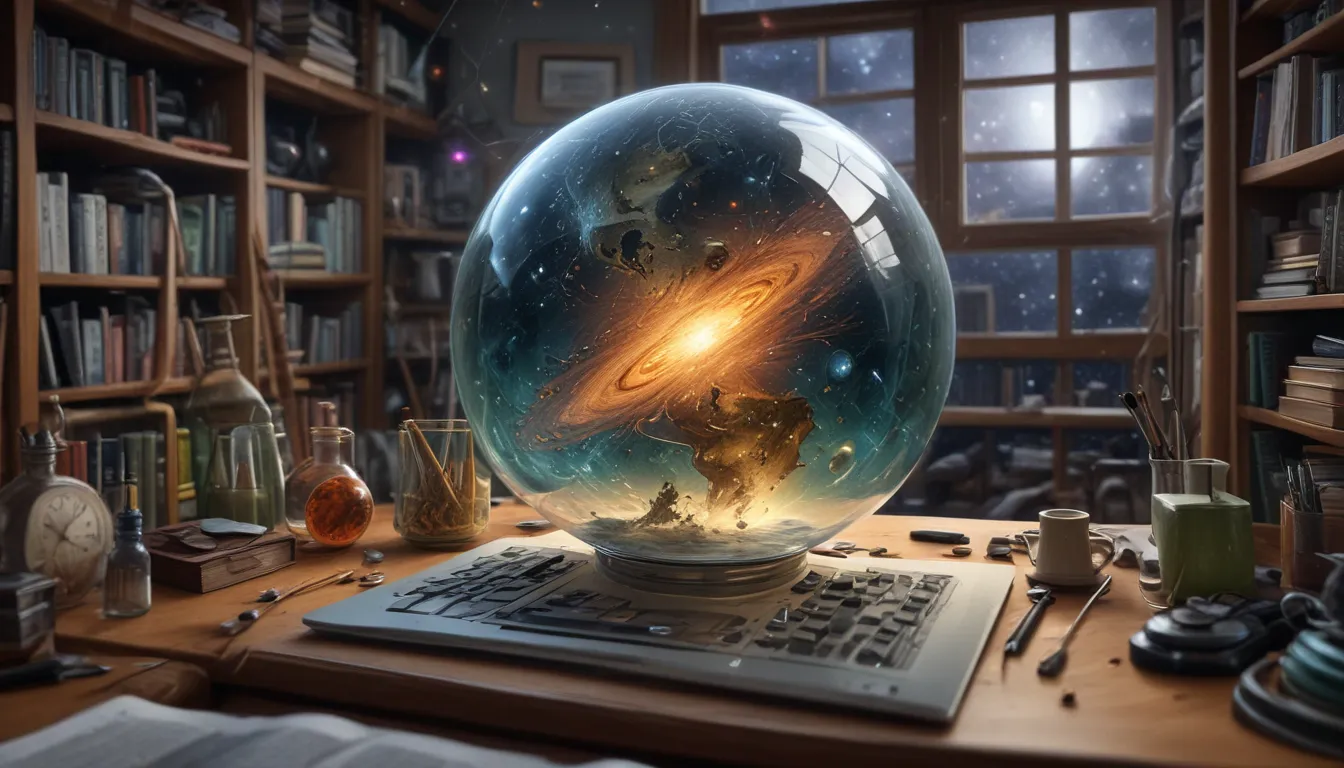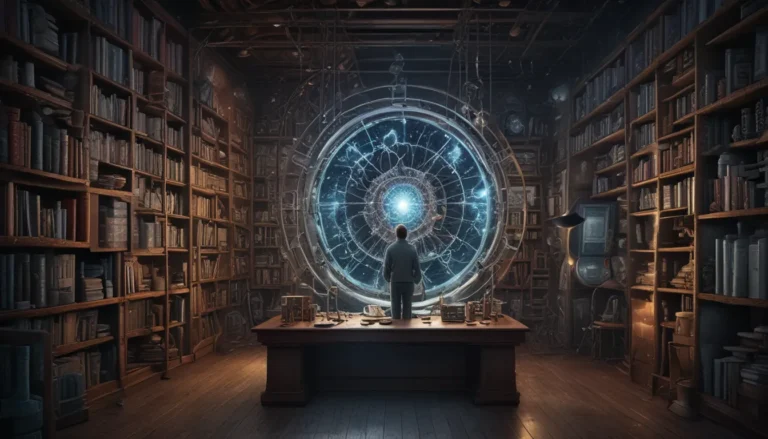A Note About Images: The images used in our articles are for illustration purposes only and may not exactly match the content. They are meant to engage readers, but the text should be relied upon for accurate information.
Welcome to the extraordinary world of relativity, a mind-bending theory that challenges our perception of space, time, and gravity. Developed by the iconic Albert Einstein, relativity has revolutionized our understanding of the universe. In this article, we will delve into 18 mind-blowing facts that will leave you in awe of the fascinating concepts behind relativity. From time dilation to the bending of light by gravity, get ready to be amazed by the wonders of relativity!
Unveiling the Theory of Relativity
Albert Einstein’s Theory of Relativity consists of the General and Special Theory, introducing groundbreaking concepts that fundamentally altered our understanding of space, time, and gravity. This revolutionary theory has shaped the way we perceive the physical universe and opened doors to a realm of mind-bending possibilities.
Time Dilation: A Phenomenon Beyond Imagination
According to the Theory of Relativity, time is not a constant but rather relative to the speed of an object or the strength of a gravitational field. This mind-boggling concept of time dilation means that time can actually slow down or speed up based on these factors, challenging our conventional notions of time.
Gravity’s Mystical Power: Bending Light
One of the most remarkable predictions of the General Theory of Relativity is the bending of light by gravity. This phenomenon, observed during a solar eclipse in 1919, provided concrete evidence supporting Einstein’s theory and showcased the incredible influence of gravity on light.
Black Holes: The Enigmatic Phenomenon
Einstein’s equations predicted the existence of black holes, regions in space where gravity is so intense that not even light can escape. This fascinating prediction has been confirmed through astronomical observations, shedding light on the mysterious and captivating nature of black holes.
The Speed of Light: A Universal Constant
The Special Theory of Relativity asserts that the speed of light in a vacuum remains constant for all observers, irrespective of their relative motion. This universal constant plays a pivotal role in numerous aspects of physics, shaping our understanding of the fundamental nature of light.
Mass-Energy Equivalence: E=mc² Unveils a New Paradigm
Einstein’s iconic equation, E=mc², demonstrates the interchangeability of mass and energy, highlighting the intrinsic relationship between these fundamental concepts. This groundbreaking concept revolutionized our understanding of the fundamental principles governing the universe.
Curvature of Spacetime: General Relativity’s Revelation
The presence of mass and energy in the universe causes the curvature of spacetime, giving rise to what we perceive as gravity. This profound concept deepened our comprehension of gravity and offered new insights into the fabric of the cosmos, shaping our understanding of the universe.
Practical Applications: Relativity in Technology
The Theory of Relativity’s time dilation effects are crucial for precise GPS calculations, ensuring accuracy in satellite positioning. This practical application highlights how Einstein’s theory transcends theoretical realms, offering tangible benefits in modern technology like GPS systems.
Time Travel: A Possibility Within Reach?
While time travel remains a staple of science fiction, relativity proposes that under specific conditions, such as traversable wormholes or strong gravitational fields, time travel could be a plausible phenomenon. This mind-bending concept continues to captivate imaginations and fuel scientific exploration.
Special Theory of Relativity: Redefining Space-Time
Einstein’s Special Theory of Relativity introduced the concept of spacetime, intertwining space and time in a dynamic dance that challenges classical notions of absolute space and time. This groundbreaking theory reshaped our understanding of the fabric of the universe, unveiling new dimensions of reality.
Rigorous Testing: Confirmation of Einstein’s Theory
Numerous experiments and observations have validated Einstein’s Theory of Relativity over the years, from the bending of starlight by gravity to precise atomic clock measurements. This robust testing has solidified the theory’s position as a cornerstone of modern physics, standing the test of time.
Gravitational Waves: A Direct Confirmation of General Relativity
The detection of gravitational waves by the LIGO observatory in 2015 provided direct evidence for a key prediction of General Relativity. These ripples in spacetime, generated by the movement of massive objects, confirmed Einstein’s theory and showcased the immense power of gravitational phenomena.
Relativity and Causality: Challenging Conventional Notions
The Theory of Relativity challenges our understanding of cause and effect, highlighting the relativity of causal relationships between observers in different frames of reference. This concept underscores the intricate and interconnected nature of events in the universe, reshaping our perception of reality.
Cosmic Insights: Relativity’s Contribution to Cosmology
Applying relativity principles to cosmology has provided valuable insights into the early dynamics of the universe, including the inflationary period and galaxy formation. By incorporating relativity, scientists have gained a deeper understanding of the cosmic origins and evolution of our universe.
Conclusion: Embracing the Mind-Blowing World of Relativity
In conclusion, the theory of relativity stands as a testament to the awe-inspiring capabilities of human intellect. From challenging our notions of time and space to unlocking the mysteries of gravity, relativity continues to captivate and inspire us. As we venture further into the depths of this mind-bending theory, we uncover new horizons of knowledge and marvel at the intricate interconnectedness of the universe.
FAQs
-
What is the theory of relativity?
The theory of relativity, developed by Albert Einstein, describes the fundamental laws governing the behavior of objects in the presence of gravity and at high speeds, revolutionizing our understanding of time, space, and gravity. -
What is the difference between special and general relativity?
Special relativity focuses on physics in the absence of gravity, while general relativity incorporates gravity into the framework, explaining the behavior of objects in gravitational fields. -
How does time dilation work?
Time dilation, a phenomenon predicted by relativity, states that time can appear to move faster or slower depending on an object’s motion or proximity to a gravitational field, leading to varying experiences of time for different observers. -
Can the theory of relativity be proven?
Extensive experiments and observations have validated the predictions of relativity, such as gravitational lensing, confirming the theory’s accuracy and reliability. -
How has relativity influenced modern technology?
Relativity plays a crucial role in various technological advancements, including GPS systems that rely on its principles for accurate time dilation calculations, showcasing its practical applications in everyday life. -
Can everyone understand relativity?
While relativity is a complex concept, simplified explanations can make its fundamental principles more accessible to a wider audience, providing insights into the captivating world of physics. -
Are there practical applications of relativity?
Yes, relativity has practical applications in diverse fields, aiding in particle physics, gravitational systems modeling, and space exploration technologies, demonstrating its relevance in modern scientific endeavors. -
Is relativity still relevant today?
Absolutely! Relativity remains a cornerstone of modern physics, driving ongoing research and technological advancements that continue to deepen our understanding of the universe and its fundamental laws.
As we embark on a journey through the mind-blowing world of relativity, let us marvel at the wonders of the cosmos and the profound implications of Einstein’s groundbreaking theory. Join us in exploring the boundless realms of science and knowledge, where each discovery unveils a new facet of the intricate tapestry that is our universe.






